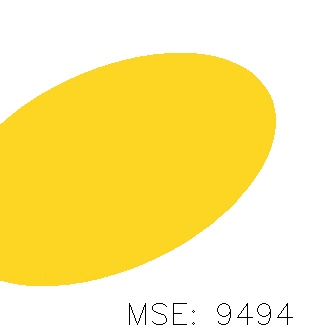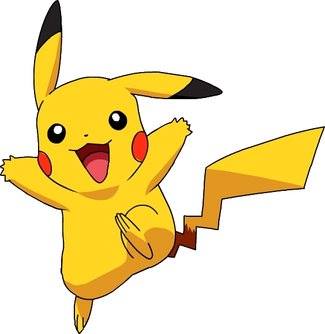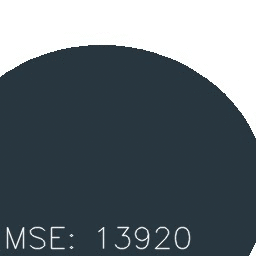This program seeks to replicate as accurately as possible an image with a genetic algorithm-like process by drawing random ellipse mutations on a blank canvas and retaining mutations that reduce the most the distance between both work-in-progress and source image.
These examples demonstrate a timelapse of the image replication process at every iteration, where the best mutation is retained.
MSE stands for Mean Squared Error, which is the distance calculation used in order to compare the work-in-progress (left) to the source image (right). It is sort of an euclidean distance, where every pixel RGB is compared between both images.
In short, the program creates, at every iteration, N mutations (random ellipses) stemming from the same parent. Whichever mutation improves the distance the most is kept, and the process is repeated M times. Even though the outcome is random, N and M determine the quality of the image produced since they allow for more exploration at the cost of longer calculation times.
cd Genetic-Algorithm-Image
pip install -r requirements.txt
python DuplicateMe.py img_dir C:/.../img.png k [int] --n_generations [int] --m_candidates [int] --verbose [bool]
out[1]:
MSE : 5956339 Progress : 337/800
MSE : 5956290 Progress : 338/800
MSE : 5950198 Progress : 339/800
...
Saved logs at C:/.../logs.txt
Saved image at C:/.../image.png
The arguments are the following:
img_dir (string) :
The path of the image to be duplicated using this genetic algorithm.
K (int) :
The number of different colors to sample from during the mutations. Strongly suggested to
adjust this variable in accordance to your image.
n_iterations (int), optional :
The number of generations to evolve from. The default is 200.
n_mutations (int), optional :
The number of mutations to create per generation. The default is 100.
verbose (bool), optional :
A boolean to decide if you want updates on the image being built at every 100th generation.
The default is 0.
Special thanks to Muzkaw for inspiring me to create my own version of this idea.



